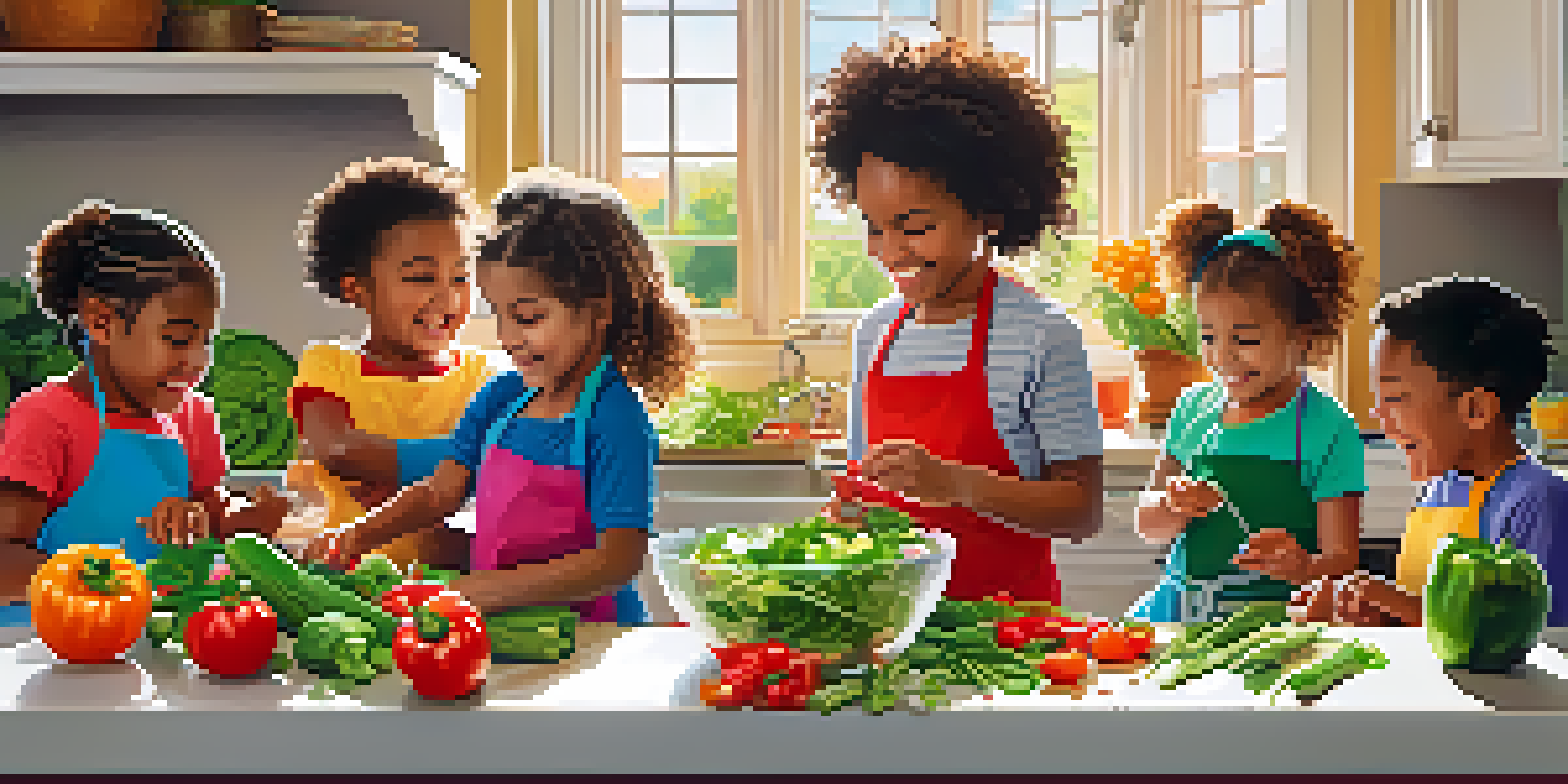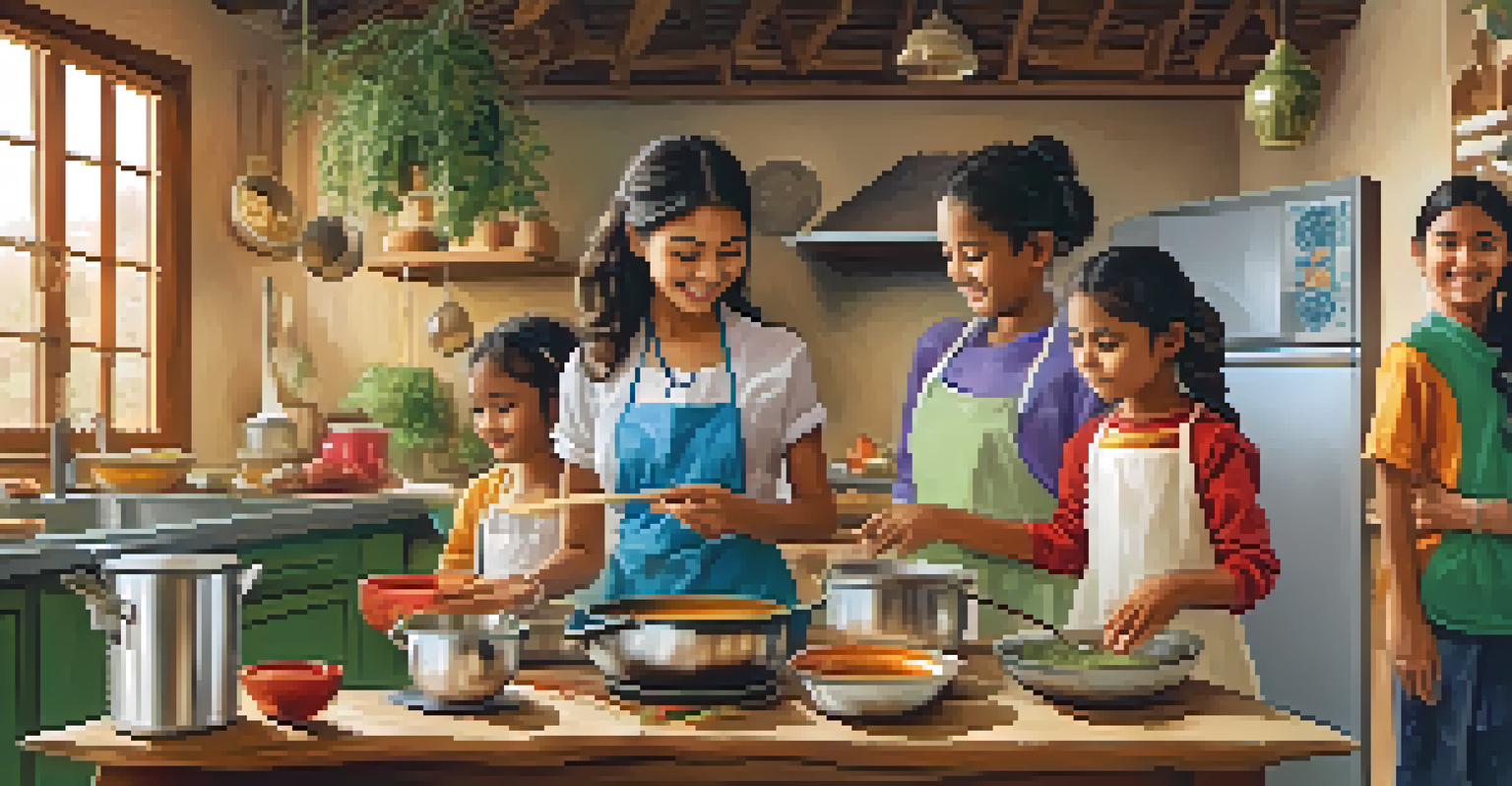The Benefits of Cooking with Children for Holistic Nutrition

Fostering a Love for Healthy Eating Through Cooking
Cooking with children is a fantastic way to introduce them to healthy foods. When they actively participate in preparing meals, they develop a sense of ownership over their nutrition. This hands-on experience can spark a curiosity about various ingredients and encourage them to try new foods.
Cooking is like love. It should be entered into with abandon or not at all.
For example, if a child helps make a colorful salad, they are more likely to eat it because they contributed to its creation. This involvement can lead to a more adventurous palate, making them more open to nutritious options in the future. Plus, it transforms mealtime into an exciting exploration rather than a chore.
Ultimately, the goal is to create a lasting appreciation for healthy eating habits. By engaging them in the cooking process, you are setting the stage for a lifetime of healthier choices. It's not just about the food; it's about creating memories and instilling values.
Building Essential Life Skills Through Cooking
Cooking isn’t just about nutrition; it’s a fantastic way for children to learn valuable life skills. From measuring ingredients to following recipes, kids develop their math and reading abilities in a fun and engaging way. These skills are not only applicable in the kitchen but also serve them well in other areas of life.

Moreover, cooking encourages critical thinking and problem-solving. If a recipe doesn’t turn out as planned, it offers a chance for children to analyze what went wrong and how to fix it. This kind of hands-on experience builds resilience and adaptability, traits that are essential for personal growth.
Cooking Builds Healthy Habits
Engaging children in cooking helps them develop a love for healthy foods and fosters lifelong nutritious choices.
As they master new techniques, children also gain a sense of accomplishment. This boost in confidence can translate to other activities, making them more willing to take on challenges. In this way, cooking becomes a powerful tool for holistic development.
Strengthening Family Bonds During Meal Preparation
Cooking together can significantly enhance family connections and communication. When everyone pitches in, it creates a collaborative atmosphere that fosters teamwork. Sharing stories and laughter in the kitchen can turn meal prep into a cherished family tradition.
The fondest memories are made gathered around the table.
For instance, setting aside a specific day each week for family cooking can lead to delightful moments and lasting memories. These shared experiences help children feel valued and understood, strengthening their emotional ties with family members. It’s in these moments that they learn empathy and cooperation.
Moreover, cooking as a family encourages open discussions about nutrition and wellness. Parents can share their knowledge about ingredients and cooking techniques, while children can express their preferences and ideas. This two-way communication promotes a supportive environment for learning and growth.
Encouraging Mindfulness and Gratitude in Kids
Cooking with children can help cultivate mindfulness, teaching them to appreciate the process of preparing food. As they chop vegetables or mix ingredients, they learn to focus on the task at hand, which can be a calming and rewarding experience. This practice of being present helps them develop a more profound respect for food.
Furthermore, involving kids in cooking can foster gratitude for the meals they eat. When they understand the effort that goes into preparing food, they are more likely to appreciate what’s on their plate. This shift in perspective encourages them to savor each bite rather than rush through meals.
Cooking Strengthens Family Bonds
Preparing meals together enhances family connections through teamwork and shared experiences.
Ultimately, these lessons in mindfulness and gratitude contribute to a more positive relationship with food. As they grow, these values can guide their choices, leading to healthier eating habits and a deeper appreciation for nutrition.
Instilling Cultural Awareness Through Cooking
Cooking is a wonderful way to explore different cultures and traditions. By introducing children to recipes from around the world, they can gain insight into diverse culinary practices and customs. This not only broadens their horizons but also promotes inclusivity and appreciation for global diversity.
For example, preparing a traditional dish from another culture can spark conversations about its origins and significance. This kind of learning is enriching and helps children understand the importance of cultural heritage. It encourages curiosity and respect for others’ ways of life.
Incorporating multicultural cooking into family routines can pave the way for a more globally minded perspective. Kids learn that food is not just sustenance; it's a bridge to different experiences and traditions. This understanding fosters empathy and connection in an increasingly interconnected world.
Enhancing Nutritional Knowledge in a Fun Way
One of the delightful aspects of cooking with children is the opportunity to impart nutritional knowledge. As they measure, mix, and cook, you can explain the benefits of various ingredients. This practical application of nutrition can make the information more relatable and memorable for kids.
For instance, when making smoothies, you can discuss the health benefits of fruits, vegetables, and yogurt. By relating nutrition to hands-on activities, children are more likely to remember and apply this knowledge in their daily lives. It transforms abstract concepts into concrete experiences.
Cooking Teaches Life Skills
Through cooking, children learn essential skills like critical thinking, problem-solving, and nutritional knowledge.
Over time, this foundational knowledge can empower kids to make healthier food choices independently. They learn to read labels, understand portion sizes, and recognize what their bodies need. In this way, cooking becomes a vital tool for fostering informed, health-conscious individuals.
Promoting Physical Health Through Cooking Together
Cooking at home is often healthier than eating out, and involving children in the process makes it even better. When you cook together, you can control the ingredients and portion sizes, leading to more nutritious meals. This practice promotes a healthier lifestyle for the entire family.
Moreover, cooking can also promote physical activity. Tasks like chopping vegetables or kneading dough engage kids in movement, which is an essential part of a balanced lifestyle. This physical engagement can be a fun way to incorporate activity into their day.

By instilling these habits early on, you lay the groundwork for a healthier future. As children become accustomed to cooking and eating well, they are more likely to carry these practices into adulthood. It’s a powerful way to encourage lifelong health and well-being.
Creating Lasting Memories Through Cooking Experiences
At the heart of cooking with children are the memories created in the kitchen. Whether it’s the first time they crack an egg or the joy of baking cookies together, these experiences become cherished moments. Over the years, these shared activities can strengthen family ties and create a sense of belonging.
Cooking also allows for creativity and experimentation, which can lead to delightful surprises. Perhaps a recipe turns out differently than expected, leading to laughter and stories to share later. These moments of spontaneity are often the ones children remember most fondly.
Ultimately, the goal is not just to prepare meals but to create a nurturing environment where love and laughter thrive. By cooking together, families can build a treasure trove of memories that will last a lifetime, enriching their relationships and enhancing their lives.